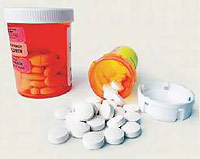|
ANTI
-
ANXIETY
DRUGS
Used to treat anxiety, obsessive-compulsive disorder, panic attacks, phobias and posttraumatic stress.
•
Ativan
(
lorazepam
)
:
Fast-acting, can be taken in small doses and has relatively few
side effects. Drowsiness and loss of coordination are most common.
•
BuSpar
(
buspirone
)
:
Must be taken for at least two weeks to achieve results. Doesn’t have sedative effect.
•
Klonopin
(
clonazepam
)
:
Longer-acting than some drugs. Sometimes causes depression.
ANTIDEPRESSANTS
Elevate mood, improve self-esteem and ease feelings of
hopelessness. The FDA has warned that 10 drugs, including those below,
could increase risk of suicide.
•
Paxil
(
paroxetine
)
:
Improvement may be noticed in a week or two, but full effect may take six weeks. Side effects generally are mild.
•
Prozac
(
fluoxetine
)
:
Only drug approved to treat kids as young as 8. Can take four
weeks to work, but effects often last up to nine months after a
three-month regimen.
•
Zoloft
(
sertraline
)
:
Improvements can occur within days. Study in the Journal of the
American Medical Association found it to be ‘‘effective and
well-tolerated."
ANTIPSYCHOTICS
Treat disorders such as schizophrenia and reduce symptoms such
as delusions and hallucinations. The FDA has warned that new
antipsychotics may cause diabetes and increased cholesterol.
•
Haldol
(
haloperidol
)
:
Frequently used for short-term treatment of behavior problems,
including combativeness and hyperactivity. Side effects can include
difficult breathing, fast heartbeat, involuntary muscle contractions
and seizures.
•
Risperdal
(
risperidone
)
:
Also used to treat autism and conduct disorders. Side effects
can range from dry mouth, fatigue and weight gain to diabetes, stroke
and other potentially fatal illnesses.
•
Zyprexa
(
olanzapine
)
:
Also used to treat mania and bipolar disorder. Some people note
more motivation and less social isolation. Can cause dizziness,
increased appetite, restlessness, sleepiness and weight gain.
MOOD
STABILIZERS
Reduce mood swings associated with bipolar disorder.
•
Depakote
(
valproic
acid
)
:
Available in three tablet strengths. Can cause serious or even
fatal liver damage, especially during first six months of treatment.
Children younger than 2 are most vulnerable.
•
Lithonate
(
lithium
carbonate
)
:
Once mania subsides, it often can be given in lower doses to
prevent future episodes. Frequent blood tests needed to prevent lithium
poisoning.
•
Tegretol
(
carbamazepine
)
:
Also used to control seizures. Children require higher doses
than adults because they absorb the drug quicker. Might cause blood
levels to fluctuate wildly.
STIMULANTS
Treat attention-deficit hyperactivity disorder.
•
Adderall
(
amphetamine
)
:
Effects begin after a few doses and it causes fewer peaks and
valleys than other drugs. Canada has taken it off-market, citing 20
deaths.
•
Concerta
(
methylphenidate
)
:
Pills last 12 hours but can be difficult to digest. Isn’t
recommended for kids under age 6. Can cause headaches, loss of
appetite, moodiness, psychosis, stomachache and upper respiratory
infection.
•
Ritalin
(
methylphenidate
)
:
Available in short- and long-acting forms. Common side effects
are abdominal pain, dizziness, insomnia, irregular heartbeat,
nervousness and weight gain. Long-term use has been linked to abnormal
brain development. Sources: National Alliance for the Mentally Ill,
National Institutes of Health, National Mental Health Association and
U.S. Food and Drug Administration

